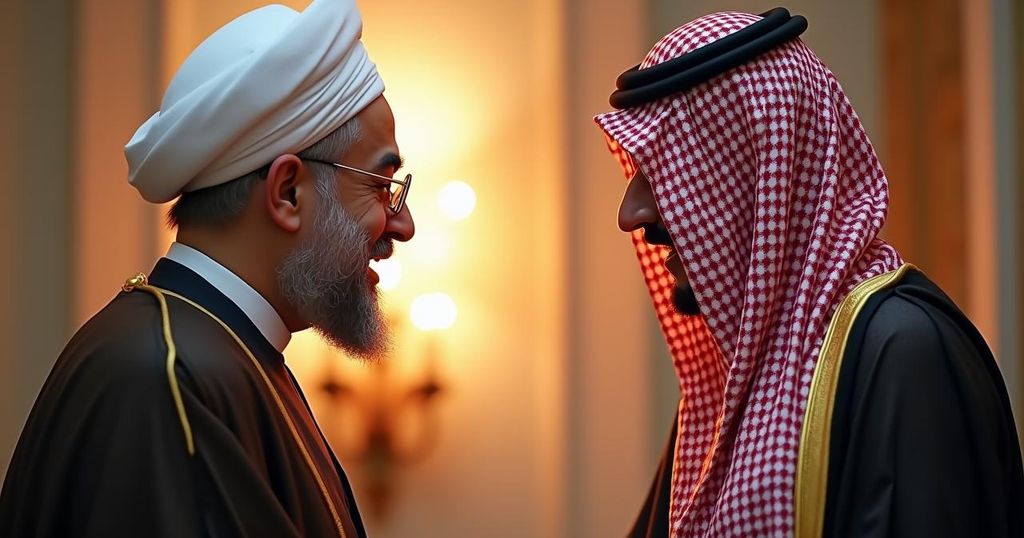Iran Issues Threats Against Saudi Arabia Amid Escalating Regional Tensions
Iran has expressed intentions to retaliate against Saudi Arabia if the latter allows Israeli attacks on Iranian targets, posing a threat to a recently established truce between the two nations. Iranian Foreign Affairs Minister Abbas Araghchi’s warnings highlight the potential for regional conflict as tensions escalate with Israel. The fragile diplomatic relations brokered by China could collapse, risking both regional stability and impacting global oil markets.
Recent tensions have arisen between Iran and Saudi Arabia, as Iran has issued threats to strike Saudi oil facilities if the Gulf nation facilitates Israeli military actions against Iran. Iranian Foreign Affairs Minister Abbas Araghchi conveyed this warning during discussions with Saudi officials in Riyadh, noting the potential deployment of Iranian-backed militias in Iraq and Yemen against Saudi interests. Observers, such as Saudi analyst Ali Shihabi, have indicated that the Iranian stance constitutes an act of war if Gulf states provide airspace access to Israel. In related reports, Iran has employed covert communications to caution other Gulf allies, including Jordan, the UAE, and Qatar, that they could also be targeted should they allow their territories for Israeli attacks on Iran. The ongoing escalation includes recent Israeli operations against Iran-affiliated Hezbollah in Lebanon and a retaliatory missile strike launched by Iran against Israel on October 1. Israeli leaders have vowed to respond, with discussions of potential actions against Iran’s nuclear capabilities and oil installations in consideration. This precarious juncture threatens the diplomatic truce brokered between Iran and Saudi Arabia earlier in 2023, which had marked a significant step toward de-escalation between these traditionally rival nations. Previously engaged in a proxy war, particularly evidenced in the conflict in Yemen, both countries had agreed under Chinese mediation to halt backing opposing militias. Saudi Arabia, under the leadership of Crown Prince Mohammed bin Salman, has aspired to stabilize the region amidst a transformative economic vision. Despite the current increased hostilities between Israel and Iran, the truce has, largely, remained intact, attributing this stability to beneficial diplomatic channels that have minimized the risk of explosive engagements across the region.
The backdrop of the article revolves around the historically contentious relationship between Iran and Saudi Arabia, critical players in the Middle East geopolitics. This relationship has been characterized by decades of proxy conflict, most notably in Yemen. The recent truce brokered by China in 2023 represents a significant diplomatic breakthrough amid a landscape fraught with violence and instability. Analysts view this negotiation as essential in countering the rise of regional tensions, particularly in the context of the increasing threats posed by Israeli-Iranian hostilities, underscored by a series of missile exchanges and military escalations. The Saudi monarch, under Vision 2030, emphasizes regional stability not only as a pathway to economic reform but also as a strategic imperative in a complex global oil market.
In conclusion, the fragile truce between Iran and Saudi Arabia faces renewed jeopardy in the wake of Iran’s threats against Saudi oil installations, which could prompt significant regional upheaval. Potentially facilitated Israeli incursions into Iranian territory, compounded by increased military strategies undertaken by Israel, place the diplomatic overtures of 2023 at grave risk. The implications of any conflict could ripple through global oil markets, emphasizing the crucial role both nations play in oil production and export stability. As diplomatic efforts continue to stave off outright conflict, the region stands at a critical crossroads requiring careful navigation by world leaders.
Original Source: www.businessinsider.com




Post Comment